 With the temperature dropping, it's time to find someone to keep you warm. Find your hookups with our online dating guide!
With the temperature dropping, it's time to find someone to keep you warm. Find your hookups with our online dating guide!
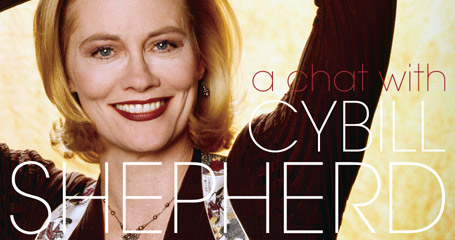
Interview date: 09/03/2008
Run date: 09/15/2008
TV Home / Entertainment Channel / Bullz-Eye Home
Cybill Shepherd first came to prominence as an actress through her film work (“The Last Picture Show,” “Taxi Driver”), but an entirely new generation came to discover her when she took on the small screen and scored Nielsen victories with shows like “Moonlighting” and “Cybill.” Recently, Shepherd has been scoring acclaim for her work on Showtime’s “The L Word,” but she’s pleased to be taking a fond look back at her sitcom, “Cybill,” which is receiving a best-of DVD set, courtesy of First Look Studios. Bullz-Eye had an opportunity to speak with Shepherd about her accomplishments on “Cybill,” what went wrong on “Moonlighting,” and how she feels about the state of Hollywood today when it comes to parts for older actresses.
Cybill Shepherd: (Cheerily) Hello, Will Harris!
Bullz-Eye: (Laughs) Hello, Cybill Shepherd! How are you?
CS: I’m doing quite well. How are you today?
BE: Not bad. Pleasure to speak with you.
CS: Nice to speak to you.
BE: Well, the first thing I noticed about the new “Cybill” set is the change in the theme song from “Nice Work If You Can Get It” to a song called “Gonna Make It.”
CS: Oh, yes, it was too expensive. We couldn’t get the Gershwin.
BE: That’s what I figured. Did you have any say in selecting the replacement song.
CS: Yes, I did.
BE: Excellent.
CS: But I had to find something that was really inexpensive. (Laughs)
BE: So how did the set come about? I know the entire series is available on DVD in the UK…
CS: Oh, yes, it’s been available for a long time.
BE: …but what led to starting off with a best-of set here?
CS: Because of the price of the music. That’s why there are no episodes with me singing. But it’s a good price for what you are getting.
BE: How easy or difficult was it for you and Christine Baranski to find the kind of modern-day Lucy and Ethel relationship that drove the show?
CS: Well, we just had the chemistry…that wonderful chemistry. Just like I had with Bruce Willis.
BE: So it was just something that was natural, right from the get go?
CS: It was there. I think that great chemistry is really something that you have between actors. You can act it, of course, but when you really have it between the actors, it just gives that extra spice.
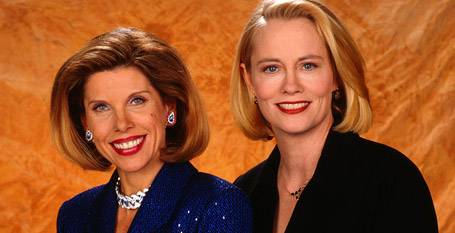
BE: Did you develop anything resembling a mother-daughter relationship with Alicia Witt and Dedee Pfeiffer? In other words, did you grow close over the years?
CS: Well, I was so thrilled that Alicia got this part that I chased after her on the CBS lot and called to have them stop her from driving off the lot and to come back, and I got to tell her she got the part. It was just wonderful; we both were crying.
BE: Have you kept in touch with her over the years as well?
CS: No, I haven’t.
BE: Have you maintained a relationship with any of the other co-stars?
CS: Not really.
BE: Fair enough. I know a lot of people just kind of move forward, but I didn’t know if you all got back together occasionally or anything.
CS: Oh, I always wanted to do a reunion show…but CBS wasn’t interested.
BE: I know the show was kind of cancelled unexpectedly, and it was especially unexpected given that it was delivering solid ratings at the time.
CS: It was very unexpected. It was “to be continued” at the end of the very last episode! It was because of the deal between the network and the studio. The network paid for the show, and the studio was supposed to pay the network back once it went into syndication. But the studio never tried to sell it into syndication, and CBS would sue the studio and get 53 million dollars, so it was that kind of…the cancellation of “Cybill” had nothing to do with the quality or anything. It was just over a deal. As the executive said when I called to try to get footage of music that they had cut out of my last episode, “All the footage is in a salt mine in Utah.”
BE: Yikes. Well, I know you have mentioned in the past that they were very skittish about the frank talk about female sexuality. Do you think you could get away with a show like ‘Cybill” today, or do you think things are even worse now then they were then?
CS: Oh ,yeah, we could get away with it today. I think that there’s something still, though…something that makes the people in charge so uncomfortable about a woman, especially a woman of a certain age, being sexual. I mean, thank God for “The L Word.” I get to do love scenes! (Laughs)
BE: And, actually, I was going to bring up that show…but, first, what do you think the best thing was that you got away with on “Cybill”?
CS: The valentine episode. That was one that I really asked that they put on. “Valentine’s Day” is what it’s called. That’s really what was the beginning of the end of the ‘Cybill” show, because what happened was, before that, we had done outrageous things involving women and women’s bodies and men and breaking the rules and making comedy out of it. But we decided to do Valentine’s Day episode, and I had heard from Gloria Steinem that, in times past, it was sometimes called Vagina Day. Now, this was even before “The Vagina Monologues”…
BE: Right.
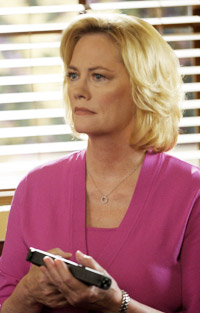 CS: …but we kind of talked about it in prime time, and we got huge ratings. The network said, “Thank you for the ratings, but don’t you ever do anything like that ever, ever again.” And that would be the final year. We went to do another menopause episode because we had, again, broken the taboo and done work on menopause, and we had it be funny and realistic and crazy. That had never been done on television. We went to do the second one, and they said, “You can only refer to women’s biological cycles as ‘women’s biological cycles.’” And so I said, “But I can use the word ‘menopause’?” And they said, “Yes.” “But we can’t use the word menstruation?” “No.” “ I can’t use the word menses?” “No.” “I can’t use the word period?” But they said, “No.” So I fought it personally, and the most that they would give us was the word “period,” and I think we were only allowed to say it once. So that was historic in terms of women’s health…and, I think, the first time anybody ever had to fight a network to use the word “period”! (Laughs) But that was beginning of the end. I mean, people started paying too much attention and trying to get us to be nice and ladylike all the time and leave the gross jokes to Drew Carey. I mean, yeah, I was supposed to be a lady, but they didn’t like that. They didn’t like that we were pushing the envelope like that. Actually, now that I think about it, I don’t know if they would like it today. I think people would be fairly shocked by what we dealt with on this show. Surely they do it on satellite.
CS: …but we kind of talked about it in prime time, and we got huge ratings. The network said, “Thank you for the ratings, but don’t you ever do anything like that ever, ever again.” And that would be the final year. We went to do another menopause episode because we had, again, broken the taboo and done work on menopause, and we had it be funny and realistic and crazy. That had never been done on television. We went to do the second one, and they said, “You can only refer to women’s biological cycles as ‘women’s biological cycles.’” And so I said, “But I can use the word ‘menopause’?” And they said, “Yes.” “But we can’t use the word menstruation?” “No.” “ I can’t use the word menses?” “No.” “I can’t use the word period?” But they said, “No.” So I fought it personally, and the most that they would give us was the word “period,” and I think we were only allowed to say it once. So that was historic in terms of women’s health…and, I think, the first time anybody ever had to fight a network to use the word “period”! (Laughs) But that was beginning of the end. I mean, people started paying too much attention and trying to get us to be nice and ladylike all the time and leave the gross jokes to Drew Carey. I mean, yeah, I was supposed to be a lady, but they didn’t like that. They didn’t like that we were pushing the envelope like that. Actually, now that I think about it, I don’t know if they would like it today. I think people would be fairly shocked by what we dealt with on this show. Surely they do it on satellite.
BE: They certainly do on cable. In fact, given that we’re talking about female sexuality, were you a fan of the “The L Word” before you came aboard as a regular?
CS: Yes, I was. I actually interviewed to be in the pilot, but they changed the story and out I went. I didn’t get to go in until the fourth season, but I was very happy. They created a wonderful character for me.
BE: Had they been promising you ever since the pilot that they were going to find a way to work you into the “The L Word”?
CS: No, they hadn’t been promising, but I was really thrilled when they came up with this idea of the character…and my daughter, Clementine, played my character’s daughter on the show as well.
BE: You’ve also been appearing on “Psych.” How many episodes are you doing?
CS: I’ll be doing my fourth and fifth episodes next.
BE: Are you committed to any beyond that, or is it just recurring as they decide to work the character in?
CS: I’m going to be in the final two episodes. I was in the first two and I’ll do the final two. (Writer’s note: I realize I’m a writer rather than a mathematician, but I’m still not sure how she’s filming her fourth and fifth episodes but will only appear in the first two and last two of the season.)
BE: Has there ever been any serious talk about trying to bring “Moonlighting” back in any capacity? Even for a one off?
CS: Yes. I mean, I talked to Glenn Caron, but he said he couldn’t think of a way to do it. And Bruce is not going to do it unless Glenn is going to do it, so it’s not going to get done.
BE: I guess it would be too easy to try to bring you back to solve the Anselmo case.
CS: (Laughs) Yeah, really.
BE: Do you ever hear from people who have previously only known you from “Moonlighting” or “Cybill” who say something like, “I just saw ‘Taxi Driver’ and had no idea you were in it until I saw it”?
CS: Yes, I have. It’s like a different generation. The two hit series I did really expanded my profile enormously, and what has brought me back has been “The L Word,” because…it’s been hard. I’ve been fighting hard and, all of a sudden, now I’m working all the time, and I’m just so grateful. It started with my committing to do this one woman show called “Curvy Widow,” which wasn’t my play; a playwright wrote it, and I was not allowed to collaborate in any way on it. It was 90 minutes of me on the stage alone; I did seven shows a week. I did it a total of about three months, first in Atlanta, and then I went to San Francisco with it. I think since I could do that, I felt…well, I’ve just never stopped working since. Sometimes, you just have to take a chance and do something that is really too hard to do.
BE: What are your thoughts on the fact that it’s harder for older women to get shots in Hollywood these days? It’s been like that for awhile, obviously, but what are your thoughts on the current climate?
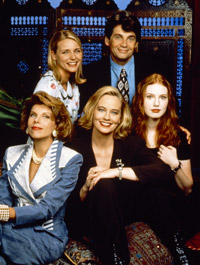 CS: Well, you know it used to be that women, we got our parts on television and in television movies. That’s where we got our great parts after the great golden age of movies. Our great parts were in television, in TV movies and comedies. Now, you know, there’s hardly any television movies made any more. It’s all reality, and they don’t do sitcoms with audiences. I don’t know there might be one or two left on the air, but they don’t do many.
CS: Well, you know it used to be that women, we got our parts on television and in television movies. That’s where we got our great parts after the great golden age of movies. Our great parts were in television, in TV movies and comedies. Now, you know, there’s hardly any television movies made any more. It’s all reality, and they don’t do sitcoms with audiences. I don’t know there might be one or two left on the air, but they don’t do many.
BE: Actually, I think most of the ones that are filmed before studio audiences are done by Chuck Lorre (producer of “Cybill”).
CS: (Laughs) Yes.
BE: Which revelation from your autobiography (Cybill Disobedience) did you end up hearing the most about from people?
CS: Elvis.
BE: Did that surprise you in the slightest?
CS: No.
BE: What was the general reaction to your autobiography? Was the response generally favorable, or were the fans surprised to learn some of the revelations?
CS: Well, it was a best-seller in hardcover on the New York Times list for eight weeks.
BE: Oh, sure, sales-wise, it was absolutely a success. I just meant fan-wise. Were they shocked to read some of the information in there? Did you hear back from a bunch of them?
CS: I think people really enjoyed it…or it seemed like they did. I think I delivered what they would expect from me, which was an almost brutal self-evaluation. I mean, honestly, for me, the book was a revelation, and what I wanted to do with the book was to start off writing it and end up learning some things; figuring stuff out. The main impetus for me writing a book at that time had to do with the “Cybill” show and trying to figure out how all that happened. Where did it go? Why did it happen?
BE: I have a couple of quick one off questions to see what you thought about certain projects in retrospect.
CS: Okay.
BE: “Silver Bears”
CS: I loved working with Michael Caine…and wasn’t Martin Balsam in that?
BE: Yeah.
CS: And Tom Smothers.
BE: And Jay Leno, too.
CS: (Laughs) Jay Leno’s first acting job. It was a blast.
BE: How about “Special Delivery”?
CS: It had a great DP. One of the greats: Harry Stradling, Jr.
BE: Do you think your pre-“Moonlighting” series, "The Yellow Rose," will ever make it on to DVD?
CS: (Thoughfully) "The Yellow Rose.” I don’t know. I think it would be fun to see, don’t you?
BE: Oh, absolutely. I remember it from…I hate to say it, but from when I was a kid. But I’ve always been a huge Sam Elliott fan.
CS: Yeah, I thought he was great. I suggested him to Peter when Peter Bogdanovich directed “Mask.” I suggested that Sam Elliott was going to be best for the part. Cher certainly was brilliant in that film as well.
BE: Were you surprised when they released “Secrets of a Married Man” on DVD?
CS: (Laughing) I was surprised because they did some kind of weird skinny thing to the picture, and it made my body look like a stick.
BE: When you went back to revisit “Moonlighting” to do the audio commentaries, was it exciting to reunite with Bruce and Glen?
CS: It was really, really fun. It was very emotional for me. I remember in one of the commentaries saying I so wish I could have enjoyed it more while we were doing it.
BE: What do you think the biggest issue was at the time?
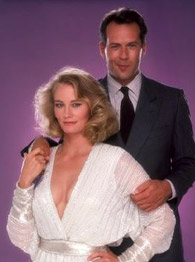 CS: It started out with the premise of a jerk that was very attractive, and then my character, Maddie Hayes, was sympathetic. But then as Bruce got more popular, he didn’t want to play the jerk anymore. And then the producers decided to take my character and make me do stupid things like marry a wimpy guy I met on a train. Glenn Gordon Caron has now said that that was the worst decision he ever made. This was before E-mail, and they had so many sacks of mail, like thousands and thousands and thousands, with people asking, “Why would you do this, why would you do this?” And at the time I said to him, “My character wouldn’t do this.” And he said, “Well, you know what, you’re not a producer.”
CS: It started out with the premise of a jerk that was very attractive, and then my character, Maddie Hayes, was sympathetic. But then as Bruce got more popular, he didn’t want to play the jerk anymore. And then the producers decided to take my character and make me do stupid things like marry a wimpy guy I met on a train. Glenn Gordon Caron has now said that that was the worst decision he ever made. This was before E-mail, and they had so many sacks of mail, like thousands and thousands and thousands, with people asking, “Why would you do this, why would you do this?” And at the time I said to him, “My character wouldn’t do this.” And he said, “Well, you know what, you’re not a producer.”
BE: Yikes.
CS: I wish I could have stood up for my character a little bit more.
BE: Last question: what’s your favorite project you’ve worked on that didn’t get the love you thought it deserved, and why did it deserve that love?
CS: “Chances Are” got a lot of love, and it did okay, but it wasn’t a huge hit. It was the wrong studio for it because, later, the director Emile Ardolino would visit Disney and Katzenberg, and they would choose him to direct “Sister Act” because Katzenberg had so loved “Chances Are.” And if “Chances Are” had been at Disney, they would have known how to market the film. But people love it. When they come up to tell me, it’s “Chances Are” that they mention so often. That’s the one.
BE: Have you stayed in touch with Robert Downey Jr. in any capacity over the years?
CS: No.
BE: I presume you’ve at least followed his resurgence, particularly this summer.
CS: Oh, of course. Of course!
BE: Alright, well, it’s been a pleasure talking to you.
CS: Thank you so much!
You can follow us on Twitter and Facebook for content updates. Also, sign up for our email list for weekly updates and check us out on Google+ as well.










